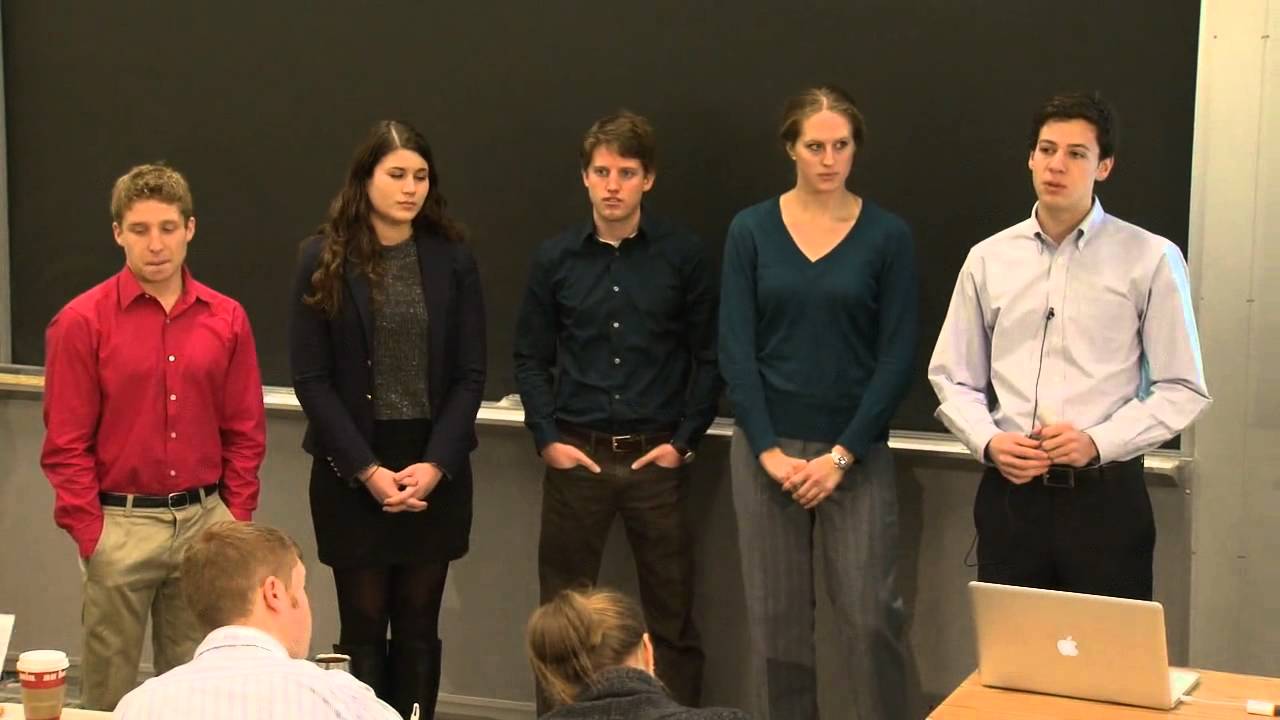Big Think
Philosopher Daniel Dennett dissects the strategies behind the game rock-paper-scissors and determines that randomness/indeterminacy is the optimal strategy. The best way to avoid being detected by your opponent is to rely on a random determination of which move to use. Some people have jumped to the conclusion that maintaining a sense of indeterminacy is optimal for living a life in which one is always in competition with outside forces. While perfect indeterminacy would be an asset for playing rock-paper-scissors, Dennett argues it’s not really that necessary in other most other aspects of life.
Read more at BigThink.com:
Follow Big Think here:
YouTube: http://goo.gl/CPTsV5
Facebook: https://www.facebook.com/BigThinkdotcom
Twitter: https://twitter.com/bigthink
Transcript – I think everybody knows the game rock, paper or scissors. Paper covers rock. Rock breaks scissors. Scissors cut paper. We all learned to play this and what you want to do is be unpredictable to your opponent. What’s the best strategy? Well, if you just don’t want to lose, your best strategy is to play randomly because then there’s no pattern in your moves so there’s nothing to track. There’s no way for your opponent to track your moves. It’s very hard for human beings to play randomly, to do anything randomly. We’re not good at creating random series. It’s been studied carefully.
So if you really — for instance, if you were obliged to play rock, paper and scissors for big bucks and you wanted to break even, here’s the strategy you might well adopt. Go to a table of random numbers and copy down a few hundred and trade the numbers in for R, P and S — rock, paper and scissors. And memorize the list or keep the list in a secure place and then play according to that list. That should pretty well guarantee that you’re moves will have no pattern that will be detectable by your opponent as long as he can’t see your list. It’s very important that you have to keep it secret. Otherwise, of course, you’re a sitting duck.
Now, I think that simple example exposes one of the seeds of the free will literature. People sense in their bones — and they don’t quite know why that it’s very important that their moves not be predictable in life. They want a certain amount of unpredictability. They don’t want to be too predictable. There’s a very good reason for this. There’s a good game theoretically is why they want to preserve a certain amount of unpredictability. Because if you’re too predictable, especially if you’re sort of hyper-rational and you’re always doing — making the best move all things considered. If somebody else could figure out what those best rules are then they could take you for a ride.
Now I think here’s what’s happened. People have recognized for thousands of years that an autonomous agent needs to preserve a certain amount of unpredictability in order to maintain autonomy. And they’ve figured as philosophers and others often do, well, if unpredictability is good, perfect unpredictability is better. And so they decided that they ought to be perfectly unpredictable. They ought to be their choices ought to be purely undetermined — a quantum undetermined. So that, as Jerry Fodor once said, “Even God couldn’t tell whether Eve would eat the apple or not.” Well, if you have to worry about God — if you’re playing rock, paper and scissors with God, then you should want quantum indeterminacy. Because then even God can’t read your list.
But for ordinary mortals, for the sorts of antagonists and interlockers we’re apt to encounter in our lives, you don’t need perfect unpredictability. We just need good enough for government work unpredictability and we can have that without indeterminacy altogether. In other words, there’s no reason to hold out hope for indeterminism. It is not a threat to free will in the important moral sense. You can have all the free will you could ever reasonably want without indeterminacy.
Directed / Produced by Jonathan Fowler, Elizabeth Rodd, and Dillon Litton
Source




I always enjoy listening to this man
I havent read his books but i think his whole point is that predictability lies in the eyes of the observer. So you could say life is deterministic but to me your actions are unpredictable. Or you could say life is determined by fate but random to all wich doesnt know fate. I would argue against that. Even if i know fate if my actions are infact predetermined i wont exist. The big movie called fate where all my actions are recordet would exist but i wouldnt hence there is no free will.
I think the idea of free will is way more attractive, so i will go with that until proven wrong.
Winning suggests a finite game, and indeed all of our society is geared towards finite games.
But there's another way to play, playing an infinite game where winning isnt the goal, but keeping the game in play indefinitely.
I'd gamble our ancestors before we stopped being nomads, were more infinite players, as they by their very nature were continually moving.
Infinite players, or to play the game of life without the goal of winning, instead to play without end is a subject worth learning, even if not to adopt, but to know other ways of living.
It's an old book by now, but a beautiful one none the less – Finite and Infinite Games by James P Carse. It might change your perception of everything around you in ways that would make Neo from the Matrix with his superhuman powers pale in comparison.
There is NYT game where you can play against a computer that looks for your patterns.
http://www.nytimes.com/interactive/science/rock-paper-scissors.html?_r=0
I've always lost badly. The funny thing is, that program is extremely predictable if I could look at it's source code. If I got the code I could beat it probably 80% of the time. (It's still pseudo-random to a large extent)
I challenge all of you determinists to a debate.
(I suggest google hangouts for the place)
And if anyone didn't notice, the video starts with a fixed assumption, which is of course that life "should be" about winning, when only in man does such limitations exist. Nature knows no such language.
These videos are good at forcing you to critically think, just not about what you think you're supposed to critically think about. ..
As a determinist, I find this even more pointless.
life is like a box of chocolates you don't know what you going to get
this is like an onion video
Free will as in "free from the workings of the universe" is absurd, but the religious need it as a puzzle piece to their jumbled mess of a belief system. An adult mind should be able to establish the whole idea as childish.
People being "critical" (they're not, they're just retards) on BigThink videos seems to be cool right now. "Oh we so intellectual. Provide us with better content". No. You're still sitting here, in your freetime, looking at your subscription box on youtube, looking for new videos, cause you got nothing better to do. Intellectualy dishonest pack.
A challange to determinists
Consider the following scenario: Humans take a Geiger-Mueller counter, and wait for a specific pattern of signals from it. If that pattern occurs, they knock down a building.
My argument: Since the pattern of the counter is caused by quantum indeterminacy (radioactive decay), there'd be no way to determine when (and if) this pattern would occur, and voilà, we have an indetermined element on a bigger scale, that could totally change the way things happen. Obviously, this is NOT to say, that any contra-causal freewill was at play, but at least it's an argument against hard determinism.
What a bunch of bollocks. You WANT predictability, call it track record, or a reputation as an "honest broker". I will not interact with someone who is unpredictable, what possible motivation would I have for doing so, given that failure in every possible human endeavour is orders of magnitude more likely than success, "betting" on an unknown is a fool's bet as the odds are overwhelmingly stacked against you.
But but but free will! Pfft, vastly overrated, "haves" are not free, we are bound by multiple obligations, those who are free tend to have nothing, so what's the point of "gambling" with people who have nothing to offer?
Can someone tell me where this Will is captured? I don't know him, but i think we should free him. People obviously care a lot about him, since you mention him in so many YouTube comments. Come on people! Let's free Will!
What's his point?
You are great
This is Dennett's example of intuition pump. The idea is to make you think. The rock paper scissors is just common ground, its a starting point that everyone knows.
Couldnt it be possible to not have free will and the universe be indeterminate at the same time? Dont know if ive heard anyone take that position. Seems to me the two are only mutually exclusive in debate if one posits the compatablistic view. This also seems to be the sole problem of creationist vs evolution debate. Both say that only one can be logically in effect if the other isnt, where as I see ways where the two could have an indirect or even no correlation whatsoever. Plus free will is merely a word association game when it comes to a definition. The word free and the word will should only be beside each other for the sake of purposeful irony.
Huzzah for the semicompatibilist argument!
i guess what he is saying is: knowing that you don't have free will must not force you to start killing people and blaming it on determinism , but in fact it must force you to study more and gain more knowledge when you are supposed to make a decision …
Did this guy really just say there is a good game theoretical reason to not be hyper rational? If someone can figure out what the best moves are they can take you for a ride? This guy clearly doesn't know what game theory is.
From reading this comment section, I have realized that most of you do not watch these videos to learn anything new, you watch them to reaffirm your pre existing notions and opinions about the world. It is sad because you miss the whole point. If you disagree with something, leave allowance for the fact that you may have not fully understood the concept in a 4min video. Jeez no wonder they disable the comments.
Personally the fair man inside hates game theory, I would rather help the underdog and be a man of honor a valiant hero Dan however seems to be advocating Nash and his famous game theory called F U buddy. Horay, horay lets start a cold war…
wtf was this getting at
Actually life is more like a box of chocolates.
So…what than? It's possible to make intelligent choices and still be a rebel? Free-Spirited flakiness is not an expression free will but the abandonment of it? It's good to be unpredictable, but striving for maximum unpredictability is ultimately self-defeating? I have great respect for Dennett as an Empiricist, but his Big Think philosophy video always leave me rolling my eyes.
Why is he so overweight?